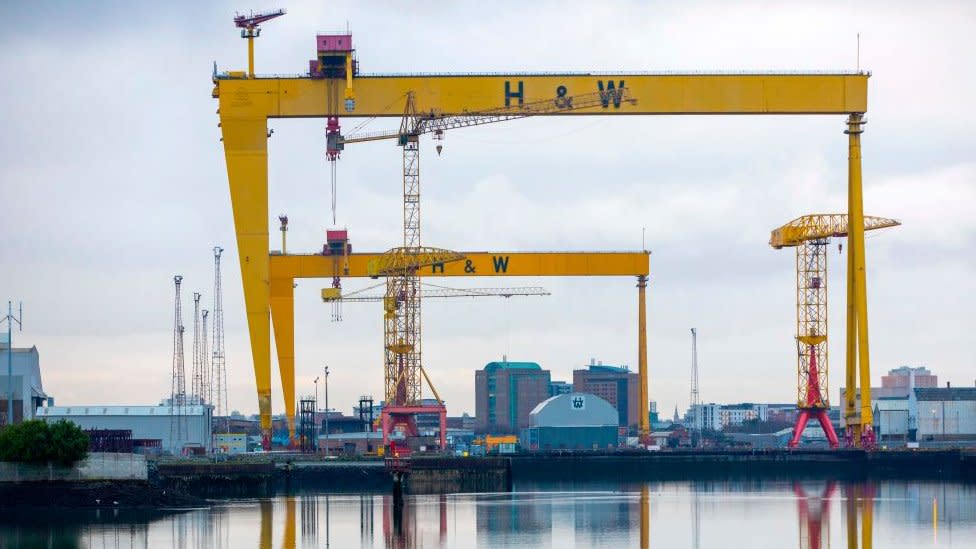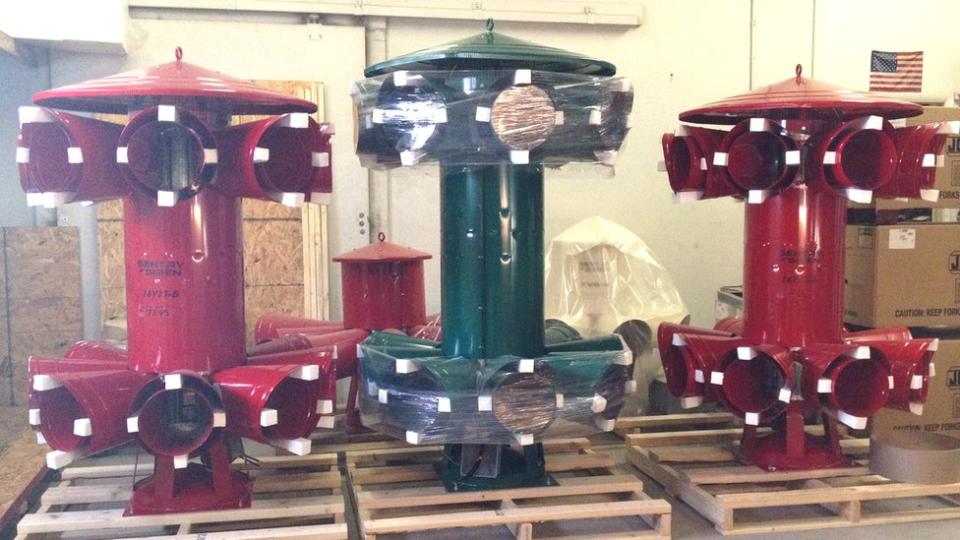Even in peaceful countries be ready for a siren blast

I was halfway through my morning run when I heard it. The sound of the apocalypse. An air raid-style siren, slowly wailing up and down in pitch, was blaring over Belfast at 0830 GMT. I glanced at the sky.
But nobody else nearby seemed to be taking any notice. My wife, who had her earphones in, hadn't heard the noise at all until I pointed it out. It was the same at the supermarket on the way home. The din of the siren was audible across East Belfast, and yet, life continued as normal.
The bizarre Belfast siren was, the BBC understands, associated with a fuel storage facility in Belfast Harbour. It is a fire alarm and has to be so loud partly because of the large size of the facility in question.
This kind of siren, so strongly associated in Britain with World War Two, is actually more than a century old, and has been used for all kinds of emergencies - not just Luftwaffe bombing raids.
Other sounds and tones are sometimes deployed for outdoor alerts, but that lazily wavering siren that is so strange and chilling is still in place at multiple sites around the country - from military bases to chemical factories. Just in case.
"That wail pattern does a great job," says Evan Kerr, VP of operations at Sentry Siren, a US firm that still makes mechanical sirens. "You need to get people's attention."
He explains that the sound is produced by a fast rotating fan inside a flat cylindrical housing, the outer rim of which is perforated with slits. It's the forcing of air through these slits, at oscillating speeds, that creates the extremely loud wail in all directions.

These days, this sound can be replicated by a digital recording played through loudspeakers but Mr Kerr argues that mechanical wailing sirens, which have been manufactured since at least 1905, are proven, reliable and nearly maintenance-free. He says some sirens made by his firm, previously known as Sterling Siren Fire Alarm Company, have been in place for many decades.
In the UK, there are air raid-style sirens in a number of locations. Notably, at the Royal Navy base in Portsmouth. This siren, which is tested regularly, would be used to warn members of the public about an accident with the nuclear-powered submarines that are stationed there.
A spokesman for the Ministry of Defence says that there are also outdoor warning alarms at naval bases on the River Clyde in Scotland and Devonport in Plymouth: "The sirens are regularly maintained and monitored. There are no plans to change the emergency alarm system."
Some siren locations are, perhaps, less obvious. Take The State Hospital, a psychiatric hospital in Carstairs, Scotland. Its siren system was sounded, for example, when two murderers escaped in the 1970s.
Broadmoor used to have a siren but this was decommissioned in 2019 and, if a dangerous individual were to escape the hospital now, an alert would be sent to locals in the form of an email or text message.
Industrial sites that handle significant quantities of hazardous materials are also legally required to have outdoor warning systems. Take Hampton Water Treatment Works in West London - even it has a siren.
In Bradford, there is a siren at a large chemical plant owned by Solenis. In information sent to locals, the company explains why an accident might be harmful. A toxic cloud could form or, for example: "A release of a flammable vapour, with subsequent ignition, may result in an explosion with the potential for damage both within the Solenis site, and outside its boundaries."
Advice from the company explains that, if people hear the siren when it is not due to be tested, they should shelter in their homes, close all windows and curtains, block incoming draughts, switch on the radio and "stay calm and rest".
In Huddersfield, chemical company Syngenta makes insecticides and other agricultural products. It too has a siren system in place to warn people in the event of a chemical emergency .
These are just some examples. There are dozens of outdoor warning sirens around the UK and many, though not all, use the familiar wailing pattern of a traditional air raid-style siren. One siren aficionado has even marked the locations of these systems on an online map.
The bizarre Belfast siren was, the BBC understands, associated with a fuel processing facility in Belfast Harbour.
But online rumours had claimed the noise signalled the movement of cranes at Belfast's famous Harland & Wolff (H&W) shipyard. H&W confirms that this was not the case.
The incident begs the question, would people react appropriately during a real emergency?
People must be informed about what sirens in their area might be used for says Andrea Davis, president and chief executive of The Resiliency Initiative, a US firm that advises communities on emergency management.
"So [they] are familiar - 'Hey, I know this sound, it's not a scary sound, it's an action sound - I need to do something'," she explains.
Failing to activate a siren during an emergency could also be harmful. Mrs Davis criticises officials in Hawaii for not using outdoor sirens when a devastating wildfire hit Maui in August 2023.

Erica Kuligowski, a social scientist at RMIT University in Australia, who has studied the efficacy of emergency warning systems agrees that sirens must be packaged with additional information that makes it clear what the warning is about, and what people should do in response.
"We need a series of pieces of information or else it's difficult to prompt people to act," she says.
The range of situations that might require a siren around the world are extremely varied. Sentry Siren, for instance, recently shipped five of its units to Iceland. They'll be used to alert people to volcanic activity, which has caused significant disruption in Iceland in recent months.
And Monika Pavlik, international business manager at Telegrafia, a Slovakia-based siren manufacturer, says her firm's devices have been deployed in Ukraine where they are used as contemporary air raid warning systems. Countries neighbouring Ukraine, fearful of Russian aggression, are increasingly interested in such sirens, she adds: "It is a constant threat."
Telegrafia specialises in sirens that use digital recordings rather than mechanical components for producing noise. But this means the devices can blast verbal information across an area or turn text into explanatory spoken word announcements.
The company's sirens, which are installed in 93 countries around the world, can also be triggered automatically - for example by sensors detecting a flood. Or, a government could set off connected sirens across an entire country in the event of a nationwide emergency.
These days, sirens tend to make the news as false alarms, or when tests of siren systems are reported locally. Most of the time, thankfully, there's no emergency. There's always a risk that people will ignore these audible warnings when something really has gone wrong, however, which is why taking multiple steps to inform the public about an unfolding disaster or accident is so important, say experts.
Despite the rise of alternative technologies such as mobile phone alerts, there is still huge demand for traditional outdoor warning sirens, says Mr Kerr of Sentry Siren: "Why wouldn't you use all the tools available to you?"

